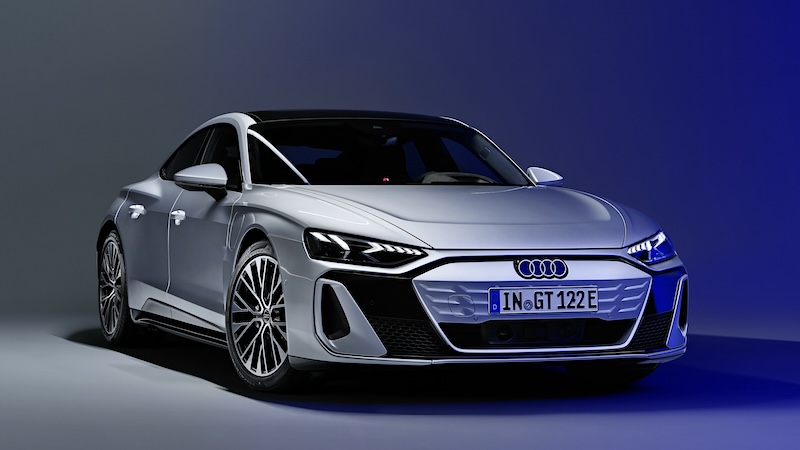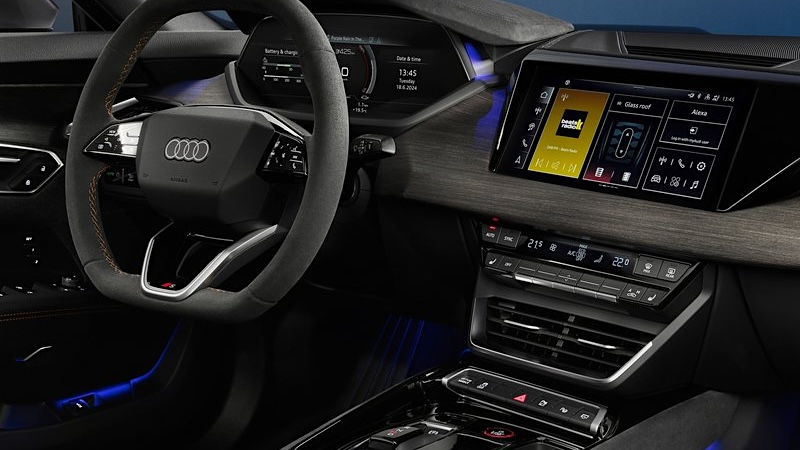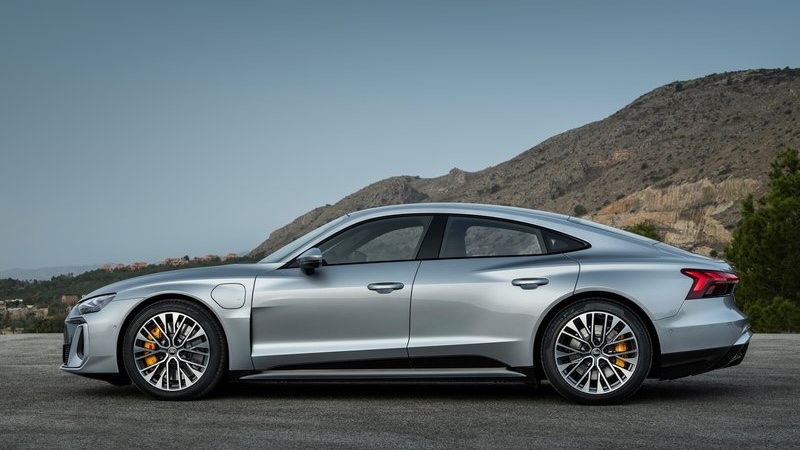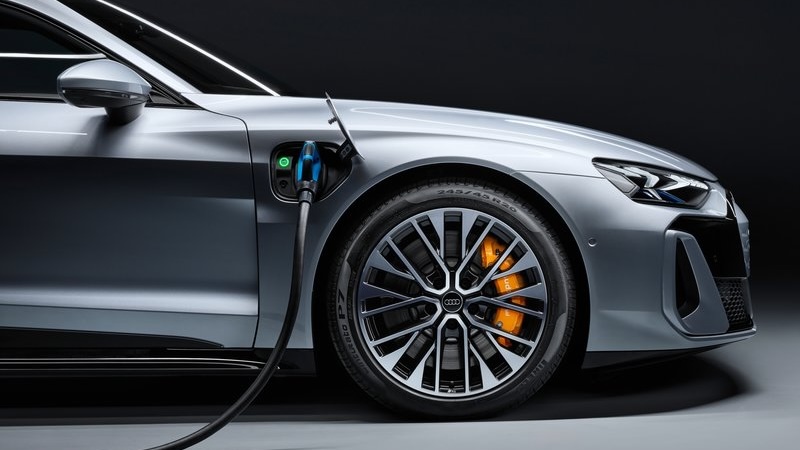Audi has unveiled the latest evolution of its electric sports car lineup, introducing three new variants of the e-tron GT range that promise to set new benchmarks for the brand.
A new lineup
Since its debut in 2021, the Audi e-tron GT quattro has been a hallmark of the brand’s commitment to electric performance and innovative design, according to Audi. The new e-tron GT family takes this legacy further with significant advancements in range, performance, and charging efficiency.
Conceiving a vehicle that must cope with the extreme weight of EV batteries is a Herculean task. To help address this challenge, the new GT range, close cousin to the Porsche Taycan, employs a newly developed suspension system said to perfectly balances driving comfort and dynamic handling.
Gernot Döllner, Chairman of the Board of Management of AUDI AG, highlights the significance of these enhancements: “With the e-tron GT models, we are setting new standards in performance. The increased charging power and electric all-wheel drive ensure improved long-distance capability and considerably more performance. The newly developed chassis offers an unprecedented range between driving comfort, ride comfort, and driving dynamics.”
Design
The new e-tron GT variants each feature a distinctive design that merges Audi’s futuristic aesthetics with functional elegance, a media release reads. While the previous front-end design made the e-tron GT’s visage an acquired taste, the refreshed features are more palatable.

The Audi S e-tron GT (above) exudes refined sportiness with its homogeneous and expressive front end, highlighted by a black mask encircling the fully closed, inverted “Singleframe” grille.
The rear is dominated by an aerodynamic diffuser with vertical fins, creating a visually deeper and sportier look.

The Audi RS e-tron GT (above) takes it further with an almost radical (yet visually pleasing) front end that features the RS-typical 3D honeycomb structure and functional L-shaped blades, giving it a lower, bolder stance. The rear incorporates motorsport elements like a streamlined diffuser and vertical red reflector.

As the first fully electric RS performance model, the Audi RS e-tron GT Performance (above, in Bedford Green metallic) stands out with exclusive design elements such as an optional matte, darkened carbon roof and carbon camouflage accents on the bumper, door trim, diffuser, and side mirrors.
Interior
Inside, the e-tron GT family reflects Audi’s new corporate identity, featuring redesigned seats, a new steering wheel, and updated digital interfaces. Sustainable materials like Dinamica microfiber and Cascade fabric underscore Audi’s commitment to environmental responsibility, the manufacturer claims.

The Audi virtual cockpit offers new information on battery temperature and charging capabilities, with RS-specific displays available in the RS cars. An advanced panoramic glass roof is available as an option, featuring polymer-dispersed liquid crystal (PDLC) technology that allows it to switch from transparent to opaque at the touch of a button.

Performance and efficiency
The e-tron GT range is powered by improved and lighter permanent-magnet synchronous motors, delivering remarkable power and efficiency, Audi says. The S e-tron GT achieves 500 kW and accelerates from 0 to 100 km/h in 3,4 seconds, with a top speed of 245 km/h.

The 640 kW RS e-tron GT sprints from 0 to 100 km/h in a mere 2,8 seconds. The RS e-tron GT Performance push these limits further, with the latter reaching a stunning 680 kW and a 0 to 100 km/h time of just 2.5 seconds. Both RS derivatives top out at 250 km/h.
Audi has also improved the high-voltage (HV) battery, increasing its energy density while reducing weight. The new battery can charge from 10 to 80 percent in just 18 minutes at high-power charging stations, and a 10-minute charge provides up to 280 kilometers of range.
Suspension and handling
The e-tron GT’s new suspension system includes an air suspension with two-chamber/two-valve technology, offering a blend of comfort and dynamic performance, Audi claims. The Audi drive select system provides multiple driving modes, including individually configurable RS modes for the RS models.
Optional all-wheel steering enhances maneuverability and stability, making the e-tron GT a pleasure to drive in any situation, Audi says. (Our take on it is that rear wheels that steer in this way it is just another unnecessary piece of kit that can fail and should therefore be avoided.)

Range up to 609 km
Audi has lowered the weight of the high-voltage (HV) battery while simultaneously increasing its energy density. Despite the higher energy content, Audi has reduced the weight of the HV battery by nine kilograms to a total of 625 kilograms. The HV battery has a gross storage capacity of 105 kWh (net: 97 kWh).
The most significant result of the improvements to the battery and motors are an achievable range of over 500 km. This represents an increase over the retiring model in the region of 40 percent!
The energy available to the new e-tron GT family via recuperation (regenerative braking) has also increased from 290 to 400 kW. The driver can select manual or automatic recuperation via the MMI as well as control it in three levels using the shift paddles.
Higher charging power
Audi has increased the maximum charging capability by 50 kW to 320 kW. Under ideal conditions, the e-tron GT family’s HV battery can charge from 10 to 80 percent in only 18 minutes at a high-power DC charge point.

In as fast as 10 minutes, the battery recharges to a range of up to 280 kilometers. In South Africa, the most powerful chargers deliver between 150 and 200 kW, so the sort of quick charge described above would take closer to 40 minutes.
Pricing and availability
The new Audi e-tron GT models are available for order in Europe, with prices starting at €126 000 for the S e-tron GT, €147 500 for the RS e-tron GT, and €160 500 for the RS e-tron GT performance. A spokesman for Audi South Africa says the e-tron GT will arrive in South Africa in 2025, but the model line-up for the country, as well as pricing, are yet to be confirmed.
The retiring Audi RS e-tron GT quattro sells for R3 527 400. It is the only e-tron GT that Audi currently offers. In the same price range are the Porsche Taycan 4S (R3 223 000) – also due for replacement by an updated model – and the Mercedes-AMG EQS53 4Matic+ sedan (R3 424 901).





























